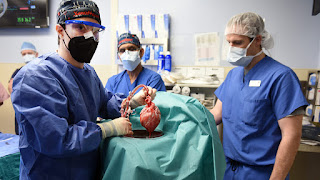PIG TO HUMAN HEART TRANSFER
US First Pig to human heart
transplant
Few days after groundbreaking transplant
surgery, David Bennett, 57, is doing well after receiving a genetically
modified pig heart, University of Maryland Medicine said in a news release on
Monday.
Mr Bennett had terminal heart disease,
and the pig heart was “the only currently available option,” according to the
release, CNN reports.
He was deemed ineligible for a
conventional heart transplant or an artificial heart pump after reviews of his
medical records.
“It was either die or do this transplant. I
want to live. I know it’s a shot in the dark, but it’s my last choice,” Mr
Bennett said before the surgery, according to the release.
The US Food and Drug Administration
granted emergency authorization for the surgery on December 31.
Prior to
the transplant, three genes responsible for rejection of pig organs by human
immune systems were removed from the donor pig, and one gene was taken out to
prevent excessive pig heart tissue growth.
Also, six human genes responsible for
immune acceptance were inserted.
According
to CNN, Mr Bennett’s doctors will need to monitor him for days to weeks to see
whether the transplant works to provide lifesaving benefits. He will also be
monitored for immune system problems or other complications.
“There are
simply not enough donor human hearts available to meet the long list of
potential recipients,” surgeon Bartley Griffith who performed the transplant
said in a statement.
“We are
proceeding cautiously, but we are also optimistic that this first-in-the-world
surgery will provide an important new option for patients in the future.”
Revivicor,
a regenerative medicine company based in Blacksburg, Virginia, provided the
heart.
A total of
106,632 people are on the national transplant waiting list, and 17 people die
each day waiting for an organ, according to organdonor.gov.
The
eight-hour operation took place in Baltimore on Friday, and the patient, David
Bennett Sr. of Maryland, is back home and doing.
“It creates
the pulse, it creates the pressure, it is his heart,” said Bartley Griffith,
the director of the cardiac transplant programme at the medical center. “It’s
working and it looks normal.”
“We are
thrilled, but we don’t know what tomorrow will bring us. This has never been
done before.”
“Mr.
Bennett decided to gamble on the experimental treatment because he would have
died without a new heart, had exhausted other treatments and was too sick to
qualify for a human donor heart, family members and doctors said,”




Comments
Post a Comment